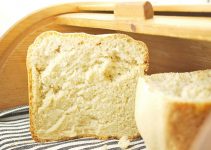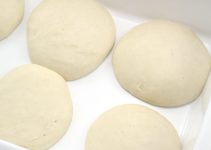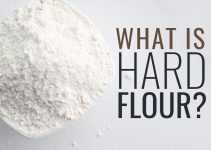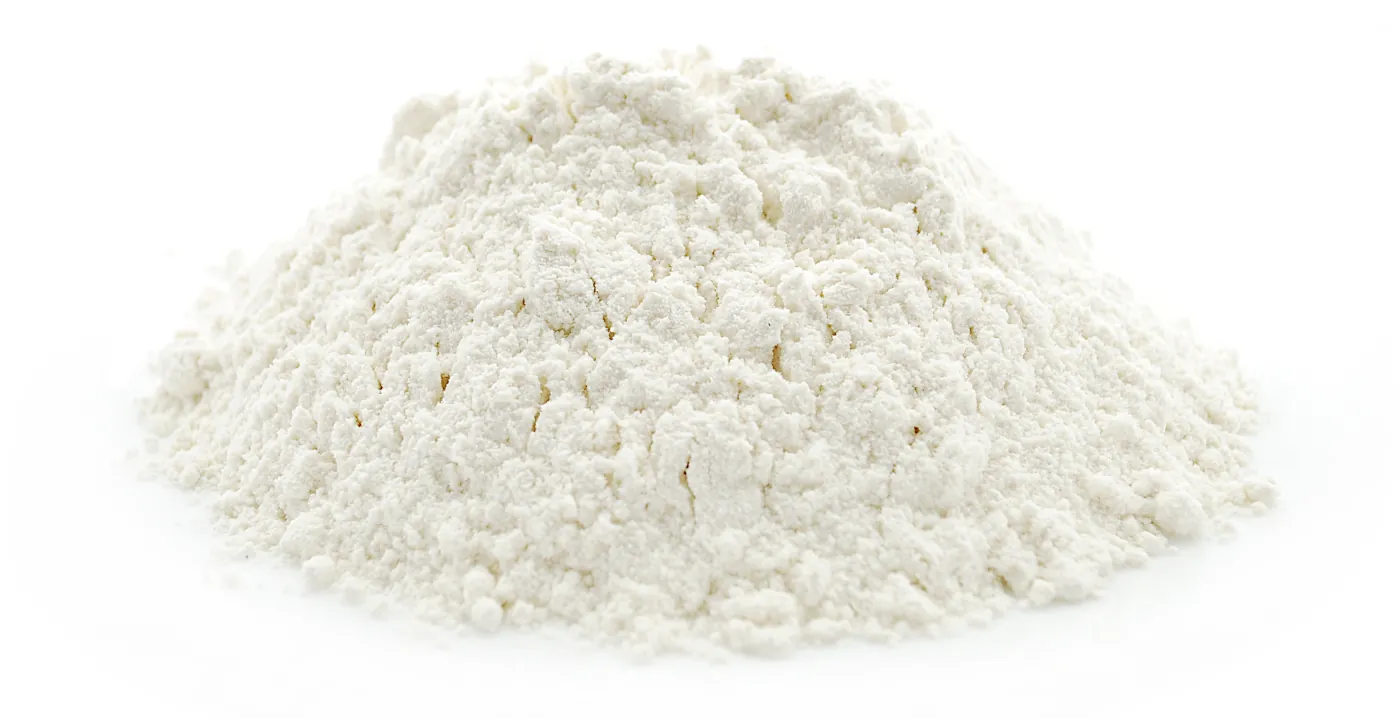
Looking for the best flour for sourdough starter and bread can be quite straightforward. I’ll try to make things as simple as I possibly can so that you can get right down to making your starter and then you can bake a delicious sourdough loaf.
By the way, I totally recommend baking sourdough bread in a Dutch oven if you want to make a loaf that compares to what artisan bakers make. It’s the best bakeware to use.
Check out my reviews for the best sourdough starter containers if you are still looking for the perfect containers.
I also talked about containers and flour in my guide on how to make a sourdough starter kit.
Even if my intention is to make things simple, I should also mention that there are a lot of sourdough starter variations.
We can have starters made with 100% bread flour/all purpose flour/whole wheat flour/rye flour. Or we can have blends between whole wheat and all purpose/bread flours. Or mixes between rye and white flours, or rye and whole wheat, etc.
Of course, we’ll also talk about gluten-free options because those are a possibility, as well.
Basically, decide if you want to make white bread, whole grain bread, a blend of the two, or gluten free sourdough bread. And then things will be a bit more simple since you know which direction to take.
Check out my reviews for the best grain mills for bread flour if you want to make your own. It can be an interesting endeavor.
Contents
Best Flour for Sourdough Starter
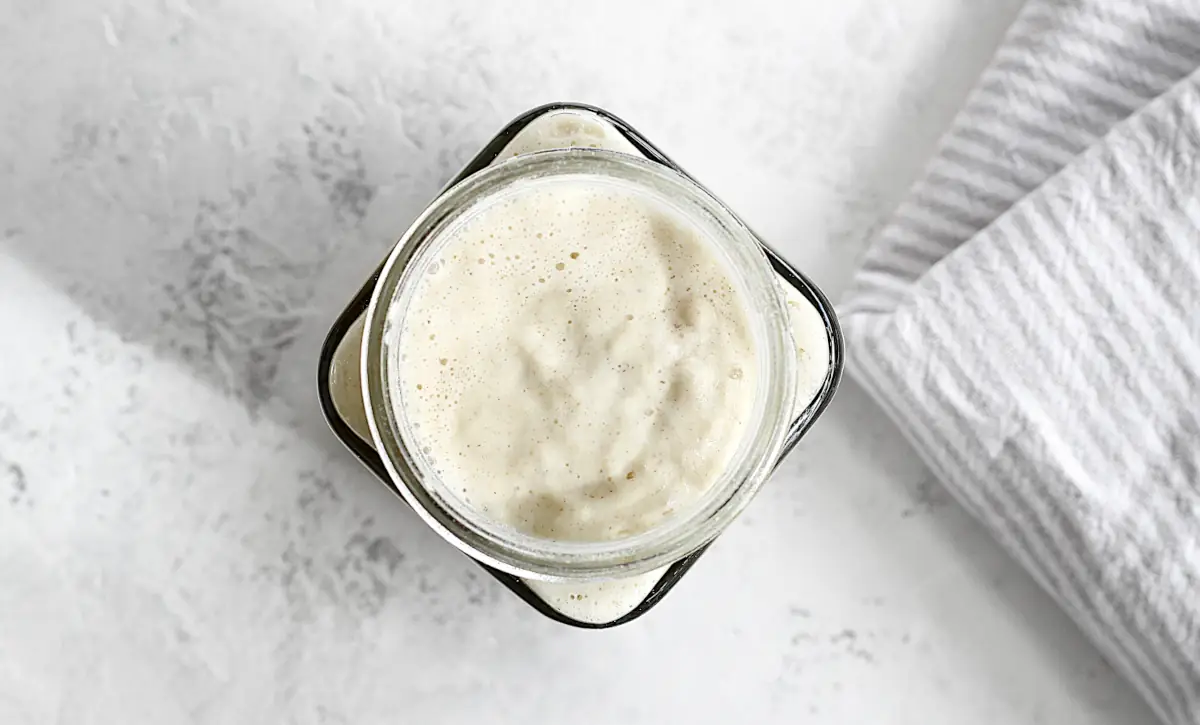
When we’re looking for the best flour for sourdough, the focus is mainly on two types: bread flour and all-purpose flour. Unbleached in both cases.
Most people won’t have any problem with making white breads so those are the two primary options to choose from.
Later on, after reviewing some of the best flours for sourdough starter and bread, we’ll also do a quick bread flour vs all purpose flour comparison so that you can decide which would work best.
In short, I recommend choosing bread flour if you can do that. Bread flour remains the best choice because it has the highest protein content.
Protein content is the feature by which we judge flours when it comes to making all sorts of baked products. Bread needs higher protein content. Pastries, not so much.
But use all purpose flour if you don’t have any bread flour at the moment.
We could say that the universal, extremely versatile flour that can work for a wide variety of baked goods is all purpose flour.
If you only want to stock up on one single type for your pantry, this is the one you should go for because it also works very well for making sourdough starter and bread.
We should also cover whole wheat flour and rye flour because there are going to be people who will want to avoid baking white loaves.
Last but not least, we should not forget about gluten-free breads. Thus, I’ll also talk about the best gluten-free flour for sourdough starter and bread. We don’t want anyone to feel left out. Just because some people need or choose to follow a certain diet, that doesn’t mean that there aren’t several adaptability possibilities.
1. King Arthur 100% Organic Unbleached Bread Flour
Let’s start by talking about prices. Organic bread flour is always going to be a bit more expensive than the non-organic kind.
So, if you don’t care about the organic label, then I definitely don’t recommend buying this one.
On the other hand, I definitely regard the King Arthur 100% Organic Unbleached Bread Flour to be my first pick for the best flour for sourdough starter and bread.
Buyers who have used it for this exact purpose call it the best bread flour they’ve ever used. They use it for sourdough bread, challah bread, pizza, etc.
Other buyers choose to use it in a blend with whole wheat flour. A blend of white bread flour and whole wheat flour is definitely popular and I love it, too.
There are some users who mention that King Arthur 100% Organic Unbleached Bread Flour has upped their sourdough game. This one has made their bread taste so much more flavorful.
All in all, it’s exceptionally good. Even if the price is quite high.
Features
Let’s start by mentioning the 12.7% protein content. That’s so good. I also love that King Arthur makes this type of information so clearly available.
The ingredients are: certified 100% organic unbleached hard red wheat flour, certified 100% organic malted barley flour.
It is made from 100% American-grown wheat. That’s another thing to love about King Arthur.
Personally, I prefer getting the 12 pack, each bag weighing 2 pounds. It’s a good deal for those who bake often but you can buy it in a smaller quantity if you don’t bake all that frequently.
2. Great River Organic Milling Lily White Bread Flour
Another amazing option for the best flour for sourdough starter and bread is this one from Great River Organic Milling.
I just have to mention that I love how all their products are organic.
And their flours are stone-ground. That’s incredible.
Plus, the prices are always very good considering the high quality we get.
Last but not least, I have to say that I love that we can buy a whole 25 pound bag. For me, it’s easier to buy in big quantities because I use a lot so I always love it when I can buy a whole big bag full of high quality flour to last me quite a while.
Really, what more can I say?
The Great River Organic Milling Lily White Bread Flour is pretty much perfect. We couldn’t ask for better.
Features
This flour doesn’t have a very high protein content. It’s described both as a bread flour and as an all purpose flour.
It’s certainly highly versatile. We can use it to make bread, cake, cookies, dinner rolls, and whatever else we want to make. If we buy the Great River Organic Milling Lily White Bread Flour and we only want to use white flour, this flour will cover all our needs.
It is an unbleached flour with no added chemicals.
The manufacturer mentions that their wheat contains at least 11.5% protein. It’s not incredibly high but it’s more than enough for making a highly successful starter.
There are plenty of buyers who use it for making sourdough starter. Someone mentioned that they can’t tell the difference between this one and KA Bread Flour. That’s good to know because King Arthur Bread Flour has a 12.7% protein content.
Another user mentioned that this Great River Organic Milling Lily White Bread Flour gives them a very nice crumb with varying whole sizes and a nice crust.
Also, if you’re not particularly interested in baking sourdough with a hard crust, you’re going to love the Great River Organic Milling Lily White Bread Flour.
3. Great River Organic Milling Bread Flour, Unbleached Wheat
Let’s get one thing straight because there seems to be a bit of misunderstanding when it comes to the Great River Bread Flour.
This is whole wheat flour.
On the packaging, we’ll find the following information: whole grain and stone-ground.
It’s absolutely fantastic that it’s stone-ground, I love that.
However, the fact that it’s called bread flour confuses some people.
Some might buy it expecting the kind of bread flour that I talked about when I reviewed the King Arthur 100% Organic Unbleached Bread Flour, which is totally white.
What we get with the Great River Bread Flour is a brown flour, a whole wheat bread flour.
It’s absolutely fantastic if whole wheat is what you’re looking for. It’s one of the best flours for sourdough, without any doubt.
However, it will be a disappointment if you’re expecting to get a large bag of white flour. It’s whole wheat.
Features
There are a lot of things to like about this Great River Bread Flour.
It’s a whole wheat flour of amazing quality.
It’s also organic and stone-ground.
I really can’t complain about anything.
We also get a 13% protein content, which is amazing.
Last but not least, I like the fact that it’s sold in a 25 pounds (11.34kg) bag. And, considering all these amazing features that I have mentioned, the price is pretty affordable.
4. King Arthur Unbleached All Purpose Flour
If there is an all purpose flour that’s I’m going to recommend as the best flour for sourdough that’s the King Arthur Unbleached All Purpose Flour.
Why is this one my favorite in this category?
Because it has a high protein content. That’s basically the main reason for preferring this AP from King Arthur.
When we make sourdough starter or bread, we need a high protein content for the dough to rise, to be elastic, and to maintain its shape.
And that’s exactly what this King Arthur Unbleached All Purpose Flour offers with its 11.7% protein content. It’s about as high as it’s going to get for all-purpose.
Moreover, with a 11.7% protein content, we’re getting quite close to the protein content for bread flour. I believe that this King Arthur Unbleached All Purpose Flour can even be used without vital wheat gluten due to that 11.7 percentage.
Features
In order to get a good price, I think the option of buying a pack of 12 bags, each measuring 2 pounds, is the best deal. But maybe you’ll find other options that are just as affordable, too.
However, there are other packaging options. We can buy it as a 5 pound bag. Or as a 10 pound bag if you want a bigger quantity.
They also have an organic version of this all purpose, with the same 11.7% protein content. Of course, the organic one is significantly more expensive.
It is unbleached and never bromated, which is exactly what we want to see.
The ingredients are: unbleached hard red wheat flour, malted barley flour.
Do people use it to make sourdough? They do and the results are amazing. People who have used both bread flour and this King Arthur all purpose mention that the results are the same for texture, flavor, and crust. That’s to be expected since we have such a high protein content.
5. King Arthur Organic Rye Flour
The way this rye flour is described on the packaging is: for complex, flavorful breads & baked goods.
So far, so perfect. That’s exactly what we’re looking for.
I should also mention that this bread is really popular among buyers for making sourdough starter and bread.
A buyer mentioned that they made the mistake of starting to grow a starter with bleached flour and had to start over with this rye flour from King Arthur and everything is working well.
Another person uses a blend of bread flour and one quarter rye flour. Of course, blends are always a good idea.
Moreover, people love the flour. And it seems to invigorate the process. That’s everything we need to know.
In the end, if you want to make a delicious starter and to bake delicious sourdough loaves, I totally recommend the King Arthur Organic Rye Flour, whether you use it alone or as part of a blend.
Indeed, whole wheat and rye flours are well-known for their fermentation powers. That’s why there are going to be many bakers who make starter from 100% whole wheat or 100% rye.
Features
The price is decent. That’s definitely one thing that always applies to King Arthur, no matter which type of flour we buy from them. And they’re all wonderful.
While this rye flour is significantly more expensive than bread flour, that’s also to be expected.
I also like the fact that we get a 3 pounds (1.36kg) bag. That’s a good amount.
Plus, we shouldn’t forget that it’s organic, which is another plus.
The ingredients are just 100% organic rye flour.
We can use it to make bread but we can also use it for desserts, like cakes, scones, and cookies. I love that it’s so versatile.
6. King Arthur Gluten Free Measure for Measure Flour
This is a very popular gluten free flour. And King Arthur even has a gluten free sourdough starter recipe that is made with their flour. That can certainly make things easier.
The starter is made with 1 cup King Arthur Gluten Free Measure for Measure and ½ cup + 1 tablespoon (128g) cool water.
The starter can be used between days 5 and 10. It’s just like any other starter recipe, the difference is that this is a gluten free sourdough starter.
Of course, there are several recipes that you can find online. If you don’t like the King Arthur Gluten Free Measure for Measure, you don’t have to buy this one.
You can use brown rice flour, buckwheat flour, sorghum flour, millet flour or any other gluten free mix that you’re already using to make bread. There are many other options we can use.
Features
The ingredients are: rice flour, whole grain brown rice flour, whole sorghum flour, tapioca starch, potato starch, cellulose, xanthan gum, vitamin and mineral blend, niacinamide, reduced iron, thiamin hydrochloride, riboflavin.
As you can see, it’s actually a gluten free flour mix that contains absolutely everything we need. It’s certainly easy to use due to the fact that it already contains all these ingredients.
What I can definitely say about the King Arthur Gluten Free Measure for Measure is that it’s definitely not among the most expensive you could buy. It’s actually quite affordable.
It’s also very popular and it’s versatile. You can use it to make sourdough bread or you can use it to make desserts. We could say that it might be the equivalent of all purpose flour in the gluten-free world.
The quantity is quite decent, too.
Each bag weighs 3 pounds (1.36kg). I’m certainly not a big fan of buying small bags of flour, it’s just a hassle since I tend to use so much.
It’s called Measure for Measure because it works as a 1:1 substitute for wheat flour.
This 1:1 substitution is another plus because it means that we can use it as a replacement in any recipe without having to worry about making any measurement alterations.
All in all, the price, the quality, the ease of use are main attributes for the King Arthur Gluten Free Measure for Measure, which also make it one of the best flours for sourdough bread if you want to make it GF.
There are also a few buyer reviews who have used this flour to make gluten free sourdough recipes and all are extremely positive, even if they’re not that many in number.
7. Anthony’s Vital Wheat Gluten
Of course, using vital wheat gluten won’t work for gluten-free sourdough starter but it can work if you want to increase the gluten for all purpose flour.
Or if you’re making whole wheat or rye starter.
Basically, it helps dough made white whole grains or dough made with a less strong flour rise better. That’s why some people will prefer using vital wheat gluten in some cases.
I heard someone say that it might be cheaper to make sourdough with all purpose and vital wheat gluten than it is to make it solely with bread flour.
That might be true, although I have never thought of it that way. I don’t know if the price difference is considerable, I might suspect that it’s not but I also don’t feel like doing any calculations now because that isn’t what interests me.
Anthony’s Vital Wheat Gluten is without a doubt among the best. This manufacturer really makes a lot of awesome products and I especially love their gluten-free flours.
The 4 pound quantity is also nice, it will last quite a while so I like that.
Why use it
Anthony’s describes this product as being high in protein. It improves elasticity and texture of dough.
People use it to increase the protein content when they’re using all purpose flour so that they can level it up to the protein content of bread flours. We can use vital wheat gluten to transform regular flour into high-gluten flour.
Others use it when they’re using whole grains flours because those are certainly not known for their elasticity.
It’s also used for making vegan and vegetarian meal alternatives. It is the main ingredient in meat alternatives like seitan.
How much vital wheat gluten should you add?
My recommendation is to add 1 tablespoon of vital wheat gluten for every 2 cups of flour.
On the other hand, there are people who add 2 teaspoons per cup.
Another recommendation would be to add 10-15g per 500g of flour.
Basically, the ratio is to use 2+% vital wheat gluten in proportion to flour.
Bread flour: The best flour for sourdough
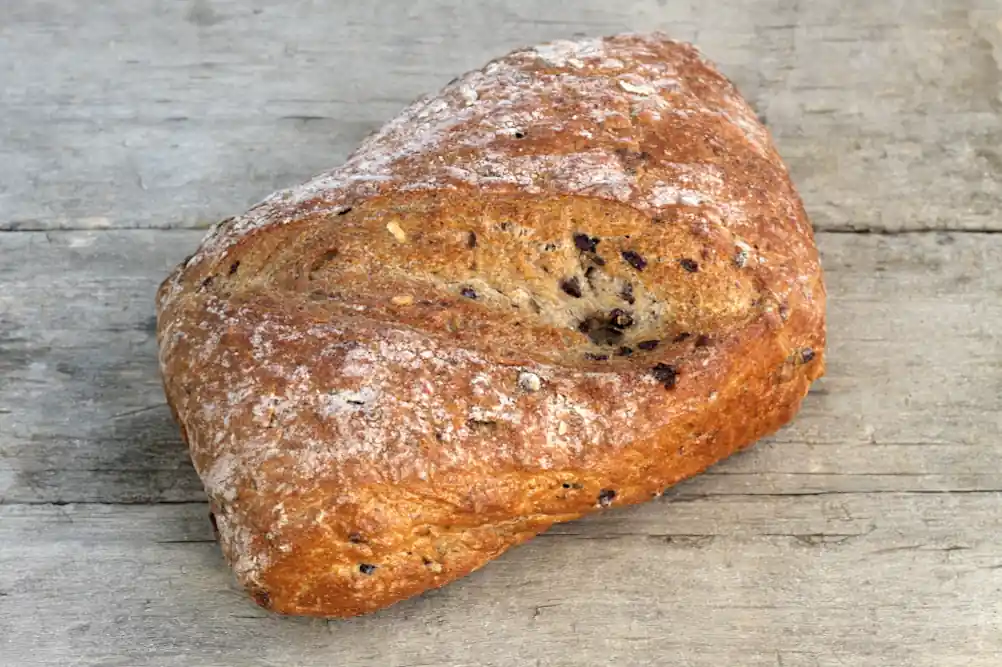
If you don’t have any problem with white loaves, bread flour should be the first choice for you. Let’s see what makes it the top choice.
Obviously, the first thing we should talk about is the protein content. This is what truly matters.
Bread flour is also known as hard flour. That attribution also comes from its high protein content.
The average protein content for bread flour is 12% to 14% gluten content. That’s high and that’s why it’s so good for making sourdough starter and bread.
It translated to 12-14 grams of protein per 100 grams flour. That’s what those percentages mean.
The dough is elastic and it holds its shape when it’s baked.
All in all, bread flour is well known for its superior rise, chewy texture, and the stable structure it creates for our baked goods.
All purpose flour: the alternative to bread flour
The first thing I want to mention is that, when we use white flours, I always go for the unbleached kind.
Bleached flour is refined. Bleaching agents (chlorine dioxide and benzoyl peroxide) are added to the flour to make it a beautiful white. It also has a softer texture.
Unbleached flour can have an off-white or yellow tint. When it’s exposed to oxygen, it will also turn a lighter white.
It’s also considered that bleached flour might not rise as well, that the chemicals might throw off the rising process. That’s why I choose unbleached, although I’m sure that there are people who have made good starters with bleached flour, as well.
The thing is that all purpose is sometimes more easy to find than bread flour. The second thing is that it might be cheaper. AP is probably among the cheapest flours we can buy.
Another thing that makes it so popular is that there’s a higher chance that you’re going to have all purpose flour in a cupboard somewhere but I wouldn’t say the same thing about bread flour.
All purpose and bread flour look identical.
The thing that sets them apart is their protein content. We already saw that we have a 12-14% gluten content for bread flour, which is definitely ideal when we’re making bread of all kinds, not only sourdough.
All purpose flour has a 9-12% protein content. This info is written on the packaging so make sure to check it out. And, obviously, choose the one with 11-12% protein content, if possible.
Some people will also add vital wheat gluten if they’re making sourdough with AP flour to increase its protein content and get it close to the protein content in bread flour.
Whole wheat flour: a favorite sourdough flour for bakers
This is the second type that belongs to the hard flour category.
Since both can be called hard flours, that also implies that their protein content is similar. The difference is that whole wheat flour isn’t as elastic and as stretchable as its white counterpart.
Thus, we have white hard flour which is also known as bread flour more generically.
And we have whole wheat flour, which is obviously not white, it’s brown.
That’s because whole wheat flour is made from the whole grain or wheat, thus the name.
It contains the bran, endosperm, and germ.
It’s also considered that whole wheat provides faster fermentation for a starter because it’s packed with nutrients and potential microbes.
On the other hand, whole wheat flour is famous for two other things.
The first is the fact that baked products don’t rise as well as bread flour or even all purpose because the bran can inhibit gluten development. And that’s why people prefer mixing it with vital wheat gluten to help it rise and provide elasticity.
The second thing and this is very important if you choose to use whole wheat as your best flour for sourdough starter is that this type is more water absorbent because bran is high in fiber. Thus, when you make your starter, you’ll need to adjust the water added accordingly. You’ll need to add more water if it’s too thick.
If this is your option, you’ll absolutely find plenty of recipes online so you don’t have to figure things out by yourself.
Just keep in mind that the end product is going to be more dense. But you probably already expect that if your preference is for whole wheat flour.
Whole wheat + bread/all purpose flour
There are also recipes that combine whole wheat flour and bread/all purpose flour.
For example, this recipe, named a beginner sourdough starter recipe, creates the starter from whole wheat flour and water.
However, the starter is fed days 3-7 with unbleached all purpose or bread flour and water.
There are definitely a lot of combinations that we can try. It can take years and years to go through them.
In the end, it’s all down to your personal preferences.
If you don’t have a problem with white sourdough bread, I totally recommend using bread flour first.
If you want whole grain bread, you can try either whole wheat or rye flours. Spelt flour also works. You can also consider using vital wheat gluten to add a boost of elasticity and for the baked goods to maintain their shape.
Rye flour
If you love a good Reuben sandwich, then you are already pretty acquainted with rye bread. Of course, we can also use it to make sourdough.
You might come across sourdough starter recipes that combine rye and whole wheat flours.
You might also come across recipes that combine rye flour and bread flour to make a sourdough starter.
Combining 90% white bread flour with 10% rye flour won’t influence the taste or the gluten development much at all so this is a blend that is quite easy to handle even for beginners.
Or you can make a starter just from rye flour, no blend.
I found this rye sourdough starter recipe on the forum from thefreshloaf.com.
The person who posted the recipe called it no muss no fuss starter. That’s a good name. You should definitely check out that recipe if you’re interested in experimenting with rye flour as the best flour for sourdough.
Rye flour is milled from rye kernels, which are also known as rye berries.
It’s different in taste from whole wheat flour, it tastes fresh and nutty. It’s definitely an interesting alternative for those who are a bit tired of whole wheat baked products.
Nevertheless, I would say that it can be harder to make sourdough starter with 100% rye because rye flour overall has a lower protein content than whole wheat flour, which is a hard flour.
Thus, rye can produce a slack, sticky, and dense dough. It can be viscous and sticky.
Types of rye flour
The world of rye flours is quite vast. Just like it is the case with wheat flour, we can also have lighter or darker rye flours.
Those that are darker will also have a more intense flavor and denser texture. If you’re looking to make desserts, choose a white rye flour, which is the lightest version. However, I wouldn’t recommend it for sourdough. Stick around to see which type you should use.
Medium rye flour is wonderful because it has a more intense flavor but it still maintains a more delicate texture, which also makes it great for making desserts.
But it can also be wonderful for making bread, like the King Arthur Organic Rye Flour demonstrates. That one is a medium and many people use it to make sourdough with fantastic results.
Dark rye flour is milled from the entire rye kernel, being similar to whole wheat flour. You might also know it by the name pumpernickel flour.
Pumpernickel flour is very dark, it’s also known as whole rye flour. It has a complex flavor but the color of the goods baked with it might scare you at first if you’re not used to it.
However, pumpernickel flour is the one we should use for sourdough starter and bread if we want to use rye because this is the type that is best for fermentation.
Medium rye flour can also work, especially if it’s from a good brand.
Would I recommend this as the best flour for sourdough for beginners? Absolutely not.
On the other hand, more experienced bakers can produce amazing starters with rye flour. The baked sourdough loaves can be flavorful and just as tall as bread baked with bread flour but it’s not as easy to reach those results.
Making sourdough starter in a bread maker
Bread machines can be a good alternative for those who don’t want to do the starter by hand. It’s quite interesting that we can make a starter in a bread machine but I don’t think that there are going to be a lot of people interested in this thing.
Overall, I think that bread makers are awesome for making dough and for baking all kinds of bread but there won’t be many people who would consider buying a machine just for its ability to make starter.
Also, there’s basically only one machine that I would recommend for this specific purpose. That’s the Zojirushi Virtuoso.
Sourdough starter recipe
The recipe is made with the following ingredients:
- 360ml water
- 260g (2 cups) bread flour
- 6g (2 tsp) active dry yeast
As you can see, yeast is used so it’s exactly a proper starter the way we’re used to doing through many feeding days.
Why is yeast used? Because this sourdough starter in a bread maker is made in 2:10 hours. By hand, it will take us 5-7 days until we bake our sourdough loaf.
We add the ingredients in the order listed.
Then, we select course 12 and press Start. In 2:10 hours it’s done. Then we can make our sourdough loaf under course 1.
Best sourdough cookbook
We’ve talked about flours but now let’s see what experts say. The easiest way to do that is to check out a fantastic cookbook written by such a professional baker.
I’m talking about the Flour Water Salt Yeast: The Fundamentals of Artisan Bread and Pizza by Ken Forkish.
The book is structured into 4 main parts:
- The principles of artisan bread
- Basic bread recipes
- Levain bread recipes
- Pizza recipes
As you can see, sourdough is called levain. Levain is a French word that is derived from the Latin word levare, which means to rise.
Thus, the starter we use to make sourdough breads is the natural culture that bakers use as a leavening source. It’s the yeast substitute in recipes.
When it comes to talking about flour, the author mentions that high-extraction flours, whole grain wheat or rye flours, and high-ash flours all contribute to more vigorous fermentation. White bread flour doesn’t belong to these categories.
On the other hand, we are also warned that they can also create a volatile culture.
Also, every type of flour (white, whole wheat, rye, etc.) has its own personality. The same goes for blends.
Sourdough starter recipe
Flour Water Salt Yeast: The Fundamentals of Artisan Bread and Pizza by Ken Forkish mentions that the best way to start a levain is to use whole grain flour: whole rye, whole wheat or a combination of the two.
Rye flours are sticky so beginners might find it more comfortable to start with whole wheat.
Whole grain is preferable because there’s more yeast and mineral content in the bran than in the endosperm.
Of course, I also want to mention that the best flour for sourdough can also be white bread flour or even all purpose flour. Many people prefer white flours and there’s absolutely nothing wrong with that.
The levain in this cookbook is made with 500 grams whole wheat flour with 500 grams of water at about 90 degrees F.
The cookbook covers the first 5 days of the process. It’s extremely well written. Of course, you can also find a lot of recipes online. Once you decide on the best flour for sourdough starter and bread, the really fun begins.

